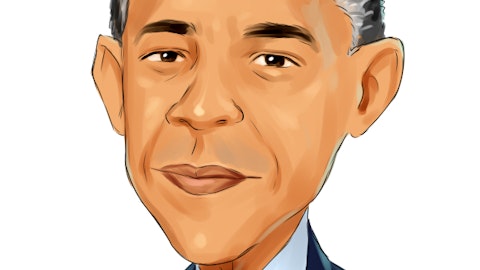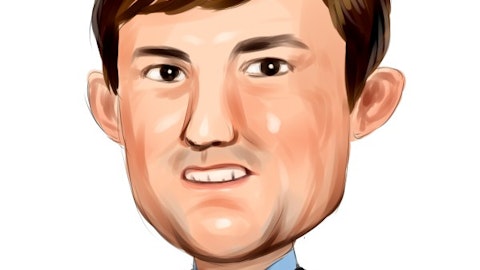Ken Griffin started trading stock options in 1986, between classes. By his sophomore year, he had enough to launch a convertible-bond arbitrage fund. The market crashed in 1987, just as he was buying, and Griffin struck it rich. By his senior year, Griffin had $1 million in investor money for the same strategy. Today, Griffin is a self-made billionaire and his Citadel Investment Group is one of the largest funds in the world.

When Ken Griffin founded Citadel Investment Group, officially, on November 1, 1990, it had $4.2 million in assets under management. According to a 13F filed with the SEC on February 14, Citadel Investment Group had a portfolio worth almost $44.32 billion, spread across 7,638 positions. In comparison, Citadel Investment Group had just under $41.24 billion in its portfolio, across 7,803 positions, at the end of the third quarter.
The largest of these positions is Apple (AAPL). Griffin had a position in the company worth $1.1 billion or almost 2.80 million shares, at the end of the fourth quarter. We don’t blame Griffin for being bullish about Apple – we are too, so is David Shaw’s D E Shaw. It is a great stock. Analysts like FBR Capital and Mizuho are saying, “buy,” or at least “market outperform,” and with good reason. Apple’s share price is expected to increase over 13% in the next year – it opened trading on February 17 at $503.18 on a mean one-year target estimate of $569.51 (range $270 to $700) – and it is priced low at 10.61 times its forward earnings.
Comparing Apple to its rival Hewlett Packard (HPQ) reveals one of the reasons why Apple is trading at a discount. Hewlett Packard is priced lower relative to its future earnings, with a forward P/E of just 6.60. Tech stocks, especially those related to personal computers, are trading at a discount. Microsoft (MSFT) and Dell (DELL) also have very low forward P/E ratios. The only thing that can justify such low P/E ratios for these stocks is a huge price war where profit margins shrink considerably. So far that’s not the case. These stocks gained around 25% over the past four months but we still think they are cheap.
Ken Griffin nearly doubled his fund’s position in Wells Fargo (WFC) during the fourth quarter, making it one of the largest positions in Citadel’s portfolio as of the end of December. It had $231 million in the company, or 8.38 million shares in the company at the end of the fourth quarter, compared to 4.28 million shares at the end of the third quarter.
As of the open of trading on February 17, Wells Fargo was trading at $30.56 a share on a mean one-year target estimate of $34.78 a share (range $25.45 to $45.00). The company also pays a 48 cents dividend (1.60% yield) and is priced low at 8.57 times its forward earnings. Warren Buffett’s Berkshire Hathaway is a big fan. It all sounds good, but compared to JP Morgan Chase (JPM), its closest competitor, JP Morgan is the winner. JPM has greater upside – it opened trading on February 17 at $38.60 a share on a mean one-year target estimate of $46.36 a share and it pays a $1.00 dividend (2.70% yield). JP Morgan is also priced lower at 7.15 times its forward earnings. Mega-cap financial stocks are another segment of the market where investors are extremely cautious. We believe a diversified portfolio of mega-cap banks will provide some protection and ample upside for contrarian investors.
Ken Griffin remained unchanged in his support of E*Trade Financial (ETFC). He maintained the same 27.4 million shares it had had at the end of the third quarter, however the value of that investment fell, moving to $249.83 at the end of September to $218.10 million at the end of December. E*Trade opened trading on February 17 at $9.29 a share, past its mean one-year target estimate of $9.25 (range $8 to $10). The stock does not pay a dividend either and with a forward P/E of 13.03 it is priced a little high. Looking at E*Trade competitor TD Ameritrade (AMTD), this sentiment is even more pronounced. TD Ameritrade opened trading on February 17 at $17.57 a share with a mean one-year target estimate of $18.74 a share (range $15 to $24). In addition to the upside, TD Ameritrade pays a 24 cents dividend (1.40% yield). It has a little higher forward P/E, but only marginally at 13.36. With all this, we would heartedly recommend TD Ameritrade over E*Trade to investors looking to invest in this market.





